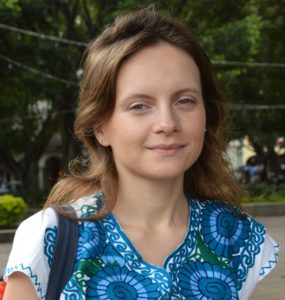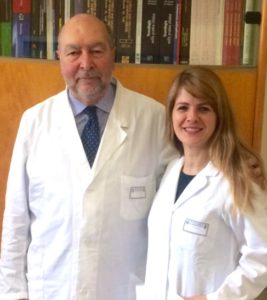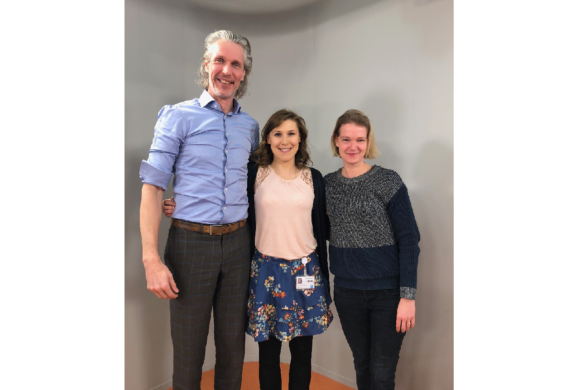
Report from Dr Aleksandra Herrera-Sokolowska from Bierutów, Poland visiting St. George’s Hospital, University of London, Atkinson Morley Dept. of Neurology, London, UK, under the supervision of Dr. Anthony Pereira
I am very thankful to the EAN for giving me the opportunity to spend six weeks in the Neurology Department at St. George’s Hospital in London, from 20/06/2016 to 31/07/2016. I did my fellowship under the supervision of Dr. Anthony Pereira and it was mainly focused on Stroke. I also participated in daily activities in Specialist Outpatient Clinics of Movement Disorders, Epilepsy, Headache, General Neurology, Dementia and Multiple Sclerosis. I was allowed to observe greater occipital nerve block for headaches, botulinum toxin injections for migraine, dystonias, hemifacial spasm and many other conditions. I have been participating in interesting lectures and I learnt about usage of botulinum toxin for numerous conditions, not only neurological – like recurrent luxation of jaw, anal fissure, siallorhea.
My working day was starting at 9 am and I was spending it mainly in Stroke, rotating between A&E, Hyperacute Stroke Unit (HASU), General Stroke Unit and the Stroke Clinic where patients after stroke were revised after the hospital treatment and rehabilitation. In the mornings I was participating in ward rounds, revision of brain scans of the patients and in the discussions about interesting cases. St. George’s Hospital is one of the UK’s largest teaching hospitals in the country and carries out an advanced medical research. I could get familiar with many clinical trials carried out in the field of stroke and epilepsy. I also was able to have an access to a greatly stocked library where I was spending my afternoons.
I was able to see how the diagnostic process of stroke, its acute treatment and further therapy is performed in the UK. I have seen many trombolysis and I could learn more about the qualification to thrombectomy. I was able to observe the carotid ultrasonography in Vascular Laboratory and to see cases of artery dissections and critical stenosis. It was especially educative for my daily practice in Poland as I am learning to perform carotid USG.
Every week there was a Neuroradiology meeting where interesting MRI and CT images were thoroughly studied. I could learn the application of certain MRI protocols and sequences to different needs and clinical situations, differential diagnosis of common MRI signs and abnormalities. In the afternoons I was observing consultations of patients in outpatient clinics. I had the opportunity to see people with rare genetic diseases, especially with movement disorders and epilepsy.
Prof. Hannah Cock in the Epilepsy Clinic was explaining me cases of every patient, she was also explaining the guidelines on epilepsy (national and international), including Vit. D supplementation during the antiepileptic treatment, different types of treatment for special clinical situations, etc. In the Movement Disorders Clinic I could see very interesting cases of different types of dystonia, parkinsonism, Tourette Syndrome. For the first time in my life I’ve seen Segawa Syndrome in a young patients and few cases of neuroakanthocytosis.
Dr Joanna Flowers explained me the differences between medications used for the treatment of certain extrapyramidal syndromes; she was telling me about therapy strategies in chronic Parkinson’s Disease and the strategies of management the side effects of the medication. In General Neurology Clinic I had a chance to see many chronic diseases of central and peripheral nervous system and to learn how they should be managed and followed up. I could practise ophthalmoscopy and the consulting doctors were explaining me all of doubts and difficult cases. It was especially helpful and educative for me because the examination of fundus is not commonly performed by neurologists in my hospital. So I gained more experience and I feel I finally can assess the eye fundus abnormalities properly.
Great Britain is a multicultural and multiethnic country and it implies that the fenotypes of many rare diseases can be seen there , and I would probably never see them in Poland. St. George’s Hospital offers its services to the patients from all over the world and I could see for myself the differences in the most common neurological diseases related to the ethnicity. For example, I’ve seen many Asian patients with stroke related to intracranial stenosis or many Afro-Caribbeans with multiple aneurysms. It made me remember the facts about which I have only red in books.
During my fellowship I have also met another clinical observers from all over the world. We were discussing about the differences in Neurology management in our countries, exchanging experiences according to the treatment and evaluations of main neurological conditions.
It is not possible to mention all the positive sides of the clinical fellowship. I am proud that I could do my fellowship at St. George’s Hospital. It was a lifetime experience, I could see how the work of doctors looks like in the UK and I’ve met many interesting people, professionals who were happy to share their knowledge with me. I would definitely choose the same hospital again if I get a chance.

Report from Dr Serla Grabova from Tirana, Albania visiting the University of Siena- Department of Clinical Neurology and Metabolical diseases, Siena, Italy under the supervision of Professor Antonio Federico
First of all I would like to express my gratefullness for giving me the opportunity to attend the EAN Fellowship in a Center of Exellence such as U.O.C Clinica Neurologica e Malattie Neurometaboliche in Nuovo Policlinico S. Maria alle Scotte from March 28rd 2016 to May 13th 2016.
During this period I attended all the daily activities in the ward, in the Electrophysology Unit and in the Outpatients Service consisting in:
- Consultations of patients on the different neurologic subspecialties;
- Follow up of patients
- Nerve Conduction Studies, Electromyography and Evoked Potentials;
- Adult patients Electroencephalography (Recording&Interpretation)
- Polysomnography and sleep neurophysiology;
- Consultations for rare neurologic and neurometabolic diseases;
I had the opportunity to learn from great professors first of all the director Prof. Antonio Federico prof. A.Malandrini e la prof. MT Dotti and to work with the best doctors such as dott. Sicurelli. All the staff (PHD candidates, residents, nurses and techinicians) were very kind, collaborative, prone to offer their help.
Attending a center of excellence for rare neurological diseases the fellowship I could improve my knowledge on this challenging and wide area of Neurology as well as on electrophysiology, especially on EEG, ENMG. I had the chance to assist also on ENG, EMG and evokated potentials implementation.
I think that the knowledge I acquired during these weeks will really be usefull in my every day job as a neurologist and neurophysiologist.
Report from Dr Alessandra Gaiani from Padova, Italy visiting the Nuffield Department of Clinical Neurosciences, John Radcliffe Hospital, Oxford, UK under the supervision of Dr. Arjune Sen
My experience at the Nuffield Department of Neuroscience, John Radcliffe Hospital, Oxford, began on the 18th of April and lasted for 6 weeks.
I was assigned a Honorary Contract as an observer medical doctor. Despite the short duration of the Clinical Fellowship, I believe this position provided me the advantage to learn as a student, with the background of a more solid knowledge. I believe this improved my personal skills, critical viewpoint and motivation.
I had the privilege to assist Dr. Arjune Sen, Consultant Neurologist and BRC Senior Research Fellow, head of Oxford Epilepsy group.
I would reassume my training programme as follows:
- Multidisciplinary treatment of focal and generalized epilepsy in a wide range of population (average of 10 outpatients /day)
- Challenging treatment of patients with multiresistant epilepsy through ward admission, therapy adjustment and video EEG study
- Follow up of patients with vagus nerve stimulator and prescription of two transcutaneous vagus nerve stimulators.
- Attendance to epilepsy multidisciplinar meetings with discussion of complex cases eligible of specific neurosurgery treatments.
- Attendance to the Oxford Masterclass in Epileptology, topic „drugs and devices“
- Active role in a research project focused on autoimmune epilepsy
- Weekly attendance to the Grand Round meeting of the entire Department of Neuroscience, with interactive discussion of selected neurological cases
- Attendance to other specialistic clinics such as the NMO clinic, autoimmune neurological disorders, peripheral nerve.
I believe that this has been a great opportunity to enrich my competence, through the comparison between different expertises and the achievement of new skills in an Academic context. I was treated like a guest and I must recognize that the inner multiculturality of Oxford was really helpful in this.
Despite this, I think that 6 weeks is a quite short period to settle in and to convert the experience in a long term research project.







